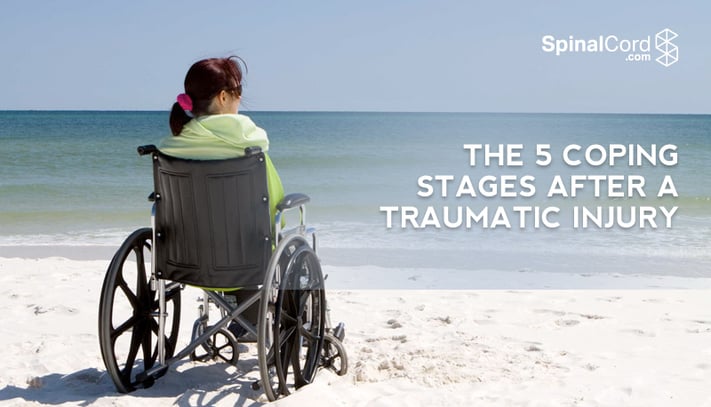The 5 Coping Stages After a Traumatic Injury

Whether you have experienced a traumatic injury yourself or have been around someone else who has, you are probably more than familiar with the harrowing emotional strain that comes along with it. Although traumatic injuries will conjure to mind physical pain, there is, unfortunately, no escaping the emotional and mental pain synonymous with this kind of situation.
Everybody deals with trauma in different ways. We are all individuals and have unique thoughts, personal experiences, and preferences; and we like to cope with traumatic events in our own individual ways. Despite our differences, when experiencing trauma, many scholars in the field of psychology and counseling, such as Dr. Glen Johnson, note similar findings which can be distinguished into stages of coping.
Although stages vary in title slightly, we will base this article on the most respected and widely-read classifications for emotional stages of grief and recovery from Elisabeth Kübler-Ross from her book entitled On Death and Dying. Although this makes reference to grief from death, we can relate this to the grief of a personal traumatic injury.
These are all reasonable and expected reactions, and nobody really knows how to react to a situation of traumatic experience, especially when it’s happening to them. Many people feel weak when going through such a range of motion. However it is natural and, in fact, part of the healing process to actively experience all the painful emotions that come hand in hand with such traumatic injuries.
The following emotions represent five coping stages after a traumatic injury.
Denial
The first stage combines various feelings and emotions, and perhaps the most turbulent as the immediate stage following the trauma. Confusion, agitation, and denial can all be found in the short time frame after the traumatic injury occurred. This can cause people to react in a way which is unusual for them, such as an introvert becoming extremely outspoken and aggressive, or perhaps the reverse order.
Patients may be feeling shock, disbelief or complete denial about the situation they have found themselves in. This is what may spur on the anxiety-based agitation. They may experience such confusion that they enter a state of such denial that a person may shut themselves off from other people to attempt to convince themselves they haven’t experienced this trauma. This stems from a refusal to accept facts.
Anger
This stage may occur at the same time as denial but often comes afterward when an individual has begun to realize what trauma they have experienced. Although some brain injuries can cause the patient to experience anger, some individuals may be coming to the slow realization of how much they have lost. They may go through waves of blame, whether on themselves or others.
As with all of this, people will manifest anger in various ways. Some may have silent anger that they keep to themselves; ruminating over and over about it. They may feel anger towards others because they couldn’t help them, or perhaps because they are jealous of the other person who hasn’t been injured.
If someone has been injured in, say, a car accident, they may feel overwhelming anger toward the person who caused the crash. Depending on how their injury was caused and their prognosis, they may reach this stage quickly, or take a longer period of time to move on from shock and dismay.
Bargaining
Although this does signify some semblance of acceptance, this stage will see individuals still bargaining to recover, for example, “I would do anything to have things how they used to be.” They may be desperate to avoid a cause of grief, and believe that with enough bargaining, they can return to their former life before the injury.
It can help keep somebody based on the positive, however, this may sometimes be seen as misinformed. This can be hard for loved ones to see, as the element of denial can still be present, making it difficult to tell the injured individual that bargaining won’t help.
Depression
This phase can lead people to turn their anger and failed bargaining inwards; pointing the blame at themselves and feeling thoughts of "what’s the point?" As time passes, an individual (although they may not like it) will slowly begin to accept, or at least realize, what has happened to them.
Realization of what life will be like from now on can cause an individual to lose faith in their future, and begin to grieve for their former life. It may be that their dreams and aspirations will now have to be reconsidered, and this can be understandably painful for those who experience it.
People may, depending on the result of their traumatic injury, experience paralysis or a similar debilitating injury which, they believe, renders them ‘useless’ or ‘worthless’. It isn’t uncommon for people to want to be alone, and exhibit the typical symptoms of depression. During this time, it is more important than ever for the patient to receive love and support from their friends, family, and caregivers to show them that they are not alone.
Acceptance
This final stage is by no means the end of the road for those who have experienced a traumatic injury. There are many ways in which a person finds acceptance, and it depends upon each individual and how they have been affected by their injury. For example, some people reach a point where they stop ‘fighting’ and begin to take the approach of “well, I can’t change it, so I might as well make the most of it.” This is the acceptance of the inevitable and realization that you cannot change what has happened.
Some people reach this stage by learning their ‘limits’; what they can and cannot do. It may suggest a sort of emotional detachment from the situation; a view of objectivity. Over time, people generally reach this stage, although you cannot put a time on it. Everybody is entitled to their emotions, at their own pace, and in a manner which is going to be best suited to their physical and emotional recovery.
Your Coping Stages are Unique
Although these stages are widely appreciated in the field, they remain broad and the bare bones of a classification of grief and trauma. They cover general emotions you would expect to feel in these situations, but there is no right or wrong way to feel. Every single person who goes through a traumatic injury will have contrasting views and feel different about that unique experience and the timeline for coping stages can vary.
As a person to have had a traumatic injury, take peace from the fact that people will understand you have lots of emotions and not much clue of how to deal with them. The reactions and feelings discussed above are normal and if anything, expected reactions, and it doesn’t make you weak for feeling them. If anything, you’re stronger for having found this article and realizing that in order to move on, you must confront your emotions.
Stay Updated on Advancements On Traumatic Brain &
Spinal Cord Injuries
About the Author





